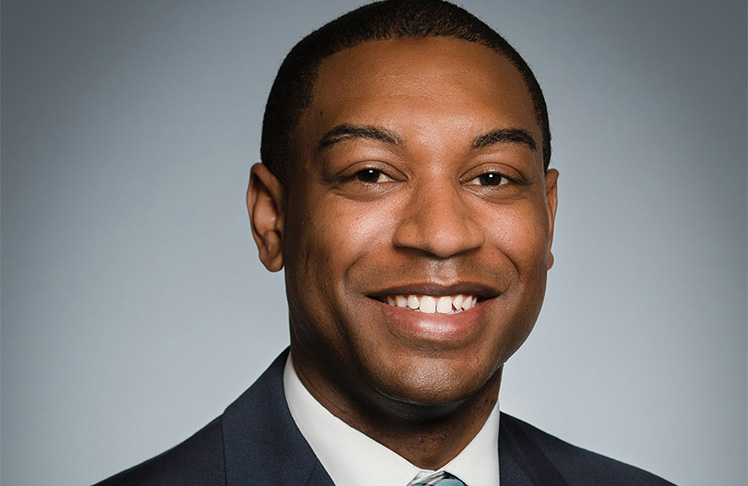
By Aaron Allen, The Seattle Medium
Olympia Mayor Dontae Payne is the latest person to escalate the issue of reparations for descendants of enslaved African people in the United States, as he recently drafted and signed a resolution unanimously passed by the Olympia City Council calling on the state of Washington and the United States government to create a commission to study and make recommendations about reparations for the descendants of enslaved African people. The resolution is the latest in a series of recommendations in the state to establish a commission to study reparations, including a unanimous vote by Washington State’s Democratic Party at their 2024 convention and a recent endorsement by the Washington State Commission on African American Affairs.
Olympia is the first of Washington’s 281 cities to unanimously pass a resolution calling for a commission on reparations. The resolution asserts that reparations are a means of addressing systemic harm inflicted upon African Americans over centuries. It states, “Reparations are a process of repairing, healing, and restoring people injured because of their group identity and in violation of their fundamental human rights by governments, corporations, institutions, and families.” It identifies potential reparations measures, including direct cash payments, land, housing, college education, and healthcare.
Payne said that the resolution is about economic equity and addressing the persistent disparities that trace back to slavery.
“This is about economic equity for Black Americans, specifically those who live within the city limits of Olympia, but ultimately, it will benefit all Washingtonians,” says Payne. “If there is a commission that’s created at the state and, or federal levels of government, reparations is about recognizing the fact that there is a legacy of economic disparity that exists as a result of having enslaved African people who were forced to come to this country and the hundreds of years that followed. Hundreds of years of slavery have resulted in a lot of income inequality and a lack of intergenerational wealth for African Americans. So, this is about not just rectifying that harm but also recognizing the harm that persists to this day.”
Former State Representative Jesse Wineberry praised Payne’s leadership, calling it a vital step forward in addressing long-standing injustices that have been cast against African Americans.
“Thank God for Mayor Dontae Payne,” said Wineberry. “He has made Olympia the first city out of 281 cities in Washington State to call for a study on reparations. This action is not only a call to our local officials to take action but also a call for the president of the United States, Congress, our newly elected governor, and our newly elected House and Senate in Olympia. Speaking on behalf of all the members of Washington Equity Now Alliance (WENA), we applaud and give the highest praise to Mayor Dontae Payne for his extraordinary leadership on this issue.”
The idea of reparations has a contentious history in the United States, where the legacy of slavery and systemic discrimination continues to affect African American communities. Dialogue around reparations has gained momentum in recent years, with Evanston, Illinois, becoming the first city to create a reparations plan in 2021. California also established a task force to study and propose reparations, setting an example for other states to follow.
However, a 2021 Pew Research Center survey revealed that most Americans view the prospect of reparations unfavorably. Only three in ten U.S. adults said descendants of enslaved people should be compensated through land, money, or other means, while 68% opposed the idea. This divide underscores the challenges faced by those advocating for reparations on both local and national levels.
Payne acknowledged the difficulties inherent in putting a price on centuries of injustice but pointed to existing scholarship on the subject.
“A study that’s been conducted by a professor—his name is Dr. William Darity—has estimated, I believe, that each Black descendant of an enslaved person should receive somewhere around $350,000,” said Payne. “That’s probably the closest thing that we’ve gotten to an actual number that seems to really have inspired or at least perked up people’s interest because generally, when we talk about reparations, it’s hard to put a price tag on hundreds of years of slavery.”
Payne added that realistic proposals are key to moving the conversation forward.
“We hear these numbers like trillions and things like that, and it’s not really a realistic number that the government can say, ‘OK, yes, we can do that.’ But making it something a little bit more practical and something that is within reach, I think, is frankly why it’s been taking this long,” says Payne.
The resolution passed by the Olympia City Council calls on the Washington State Legislature, the Office of the Governor, Congress, and the President of the United States to form commissions to study reparations. It also supports the Washington State Commission on African American Affairs’ recommendation to establish the Charles Mitchell Commission to Study Reparations.
In addition, the resolution encourages other Washington cities and counties to adopt similar measures and directs Olympia’s city staff to research potential city-scale actions to advance reparative justice. The city has already prioritized increasing Black homeownership through initiatives tied to its Affordable Homeownership Research Study and housing strategy. It also urges Thurston County to collaborate with the Black Homeownership Initiative in King and Pierce counties to address racial inequities in housing on a regional level.
Payne sees these efforts as part of a larger push to address systemic inequalities that have persisted for generations.
“This is about more than recognition,” he said. “It’s about real, practical actions that create opportunities for equity and healing.”
As the movement for reparations continues to gain traction in Washington and across the United States, Payne’s leadership in Olympia could serve as a model for other cities and states.
“This is about taking responsibility for our shared history and working toward a future where equity is possible for everyone,” Payne said.
“We are at a moment where we have a tremendous opportunity to really make meaningful change for lots of people,” added Payne. “Reparations wouldn’t just benefit Black Americans, but it would benefit everyone else as well. The reason that it will is because when you are lifting up people in this way to create intergenerational wealth, reparations in many ways will be a stimulant to our economy.”


